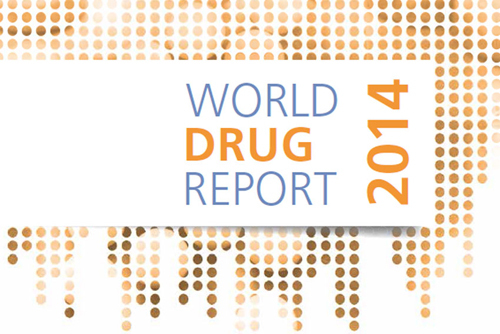
Global drug use stable, but nearly 200,000 deaths still recorded : UN
New York, June 27 (IBNS): Global drug use has stabilized, but some 200,000 people are still victims of drug-related deaths, according to the latest World Drug Report from the United Nations Office on Drugs and Crime (UNODC).
“On the International Day against Drug Abuse and Illicit Trafficking, I urge the international community to strengthen its efforts to confront illicit drugs as an integral element in building a safe and sustainable future,”Secretary-General Ban Ki-moon said marking the International Day, which coincided with the report’s launch on Thursday in Vienna.
Globally, it is estimated that in 2012, between 162 million and 324 million people, corresponding to between 3.5 per cent and 7.0 per cent of the world population aged 15-64, had used an illicit drug – mainly a substance belonging to the cannabis, opioid, cocaine or amphetamine-type stimulants group – at least once in the previous year. The extent of problem drug use by regular drug users and those with drug use disorders or dependence remains stable at between 16 million and 39 million people.
While the Internet continues to be used as a means of drug trafficking and illicit trade in precursor chemicals, use of the so-called “dark net” has been growing, the report says. The “dark net” constitutes a virtual marketplace, which is inaccessible by web search, and where it is difficult for law enforcement authorities to identify website owners and users, as their identities remain hidden by means of sophisticated concealment methods. That makes the “dark net” a safe haven for buyers and sellers of illicit drugs.
The dismantling of one prominent “dark net” site, the “Silk Road”, uncovered that the site had approximately $1.2 billion worth of revenue from two to five years of operations.
The World Drug Report provides an annual overview of the major developments in drug markets for the various drug categories, ranging from production to trafficking, including development of new routes and modalities, as well as consumption.
A section of the 2014 survey provides a global snapshot of the latest developments with respect to opiates, cocaine, cannabis and amphetamines – including "ecstasy" – and the health impact of drug use. Another section addresses the control of precursor chemicals used in the manufacture of illicit drugs.
For the first time, the report presents joint estimates by UNODC, the World Health Organization (WHO), the Joint UN Programme on HIV/AIDS (UNAIDS) and the World Bank on the number of people who inject drugs and the number of people who inject drugs and are living with HIV.
Launching the report in Vienna, UNODC Executive Director, Yury Fedotov, appealed for a stronger focus on the health and human rights of all drug users, but particularly those who inject drugs and are living with HIV.
“There remain serious gaps in service provision. In recent years, only one in six drug users globally has had access to or received drug dependence treatment services each year”, he said, saying that some 200,000 drug-related deaths had occurred in 2012.
The UNODC chief said sustainable success in drug control required firm international commitment. A balanced and comprehensive approach addressing both supply and demand should be backed up by evidence-based responses focusing on prevention, treatment, social rehabilitation and integration.
Commenting on the report, Mr. Fedotov noted that controlled substances should be made more widely available for medical purposes, including for ensuring access to pain medication, while preventing their misuse and diversion for illicit ends.
Opiates and opioids top the list of problem drugs that cause the most burden of disease and drug-related deaths worldwide.
For the third consecutive year, Afghanistan, which has the world’s largest opium poppy cultivation, saw an increase in the area under cultivation (from 154,000 hectares in 2012 to 209,000 hectares in 2013). In addition, Myanmar witnessed expansion in the area of opium poppy cultivation, although less pronounced.
World Drug Report 2014. Credit: UNODC
Support Our Journalism
We cannot do without you.. your contribution supports unbiased journalism
IBNS is not driven by any ism- not wokeism, not racism, not skewed secularism, not hyper right-wing or left liberal ideals, nor by any hardline religious beliefs or hyper nationalism. We want to serve you good old objective news, as they are. We do not judge or preach. We let people decide for themselves. We only try to present factual and well-sourced news.







